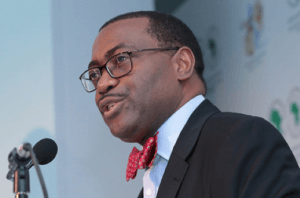AfDB to triple climate finance in Africa to $5b yearly

The African Development Bank (AfDB) says it will lead the way on green growth and triple its climate finance in Africa to $5 billion per year by 2020.
The lack of electricity has also been cited as the greatest hindrance to development in Africa. More than 645 million Africans – some two-thirds of the people on the continent – have no access to electricity and over 750 million do not have clean energy for cooking.
Speaking at the opening of the 51st Annual Meetings of the AfDB, his first as president of the Africa focused multilateral, Dr. Akinwumi Adesina had denounced the situation and laid out the Bank’s strategy to address both the climate change challenges of the continent and lack of electricity.
He also noted the devastating effects of El Nino on African countries, indicating that the Bank is providing financing of $549 million to support countries to deal with drought and reduce vulnerability.
He said the AfDB will invest $12 billion in the energy sector over the next five years to deliver on the New Deal on Energy for Africa – the Bank’s strategy.
“We expect to leverage $45-50 billion into the energy sector,” he added.
Dr. Adesina said to accelerate the impacts of the Bank’s Ten Year strategy, there is a sharp focus of the Bank’s work around five top priorities called the High 5s: Light Up and Power Africa; Feed Africa; Industrialize Africa; Integrate Africa; and Improve the quality of life for the people of Africa.
“Africa is simply tired of being in the dark. Our goal is clear: universal access to energy for Africa within ten years. Expand grid power by 160 Gigawatts. Connect 130 million persons to grid power. Connect 75 million persons to off grid systems. And provide access to 150 million households to clean cooking energy,” he said.
He also called on the Green Climate Fund and the Global Environment Facility to pay for the insurance premium of African countries to the Africa Risk Capacity Agency. This, he said, will allow them to cope with extreme climate events that lead to huge fiscal stress.
“Such insurance has significant impacts. It allowed Senegal to receive a $17 million pay out to mitigate the impacts of drought. The African Development Bank will lead the way on green growth and will triple its climate finance to $5 billion per year by 2020,” he said.
He noted that the Bank has now established a new Vice Presidency complex on power, energy and green growth.
“This makes the Bank the first Multilateral Development Bank globally to fully dedicate a Vice Presidency complex entirely to energy: to light up and power Africa. Our focus will be on energy systems, renewable energy, energy policy, statistics and regulations; and energy partnerships,” he said.
In his address, the President of Zambia, Edgar Chagwa Lungu, reiterating the theme of the Annual Meetings; Energy and Climate Change; he said these are issues that threaten to erode the continent’s economic gains of the past decade if not addressed.
“Our expectations are that these meetings will generate resolutions that will help Africa shape its post 2016 development agenda and address the numerous ramifications of energy deficits and climate change confronting the continent.
I am confident that our expectations will be met given an array of expertise and experience from your Excellencies, Heads of State and government and high profile finance and development experts participating,” he said.
President Lungu noted that energy shortages and climate variability and change have become a major threat to sustainable development in Africa, adding that growth on the continent has already been reduced.
Citing the International Monetary Fund World Economic Outlook, he said it has estimated growth at 3 per cent, a level that is well below the 5 to 7 per cent range experienced over the past decade.
President Lungu indicated that whilst the slump in commodity prices has played a role in this slow down, energy shortages and climate change related issues have played even a bigger role in dampening growth prospects hence putting the poorest of the continent in a precarious position as far as food security is concerned.
“It is now clear that these two issues have increasingly crystalised into a binding constraint to the continent’s growth.
Zambia has not been spared of the impacts of energy shortages and climate variability. Our economic prospects have been negatively impacted. Below normal rainfall experienced in 2015, continued in 2016 causing electricity generation to reduce by 3.3 per cent last year while in 2016 generation is projected to contract by 38.9 per cent,” he said.
This gathering is also the 42nd Meetings of the African Development Fund of the AfDB. It concludes on May 27, 2016.
By Emmanuel K. Dogbevi, in Lusaka, Zambia
Copyright © 2016 by Creative Imaginations Publicity
All rights reserved. This article or any portion thereof may not be reproduced or used in any manner whatsoever without the express written permission of the publisher except for the use of brief quotations in reviews.
